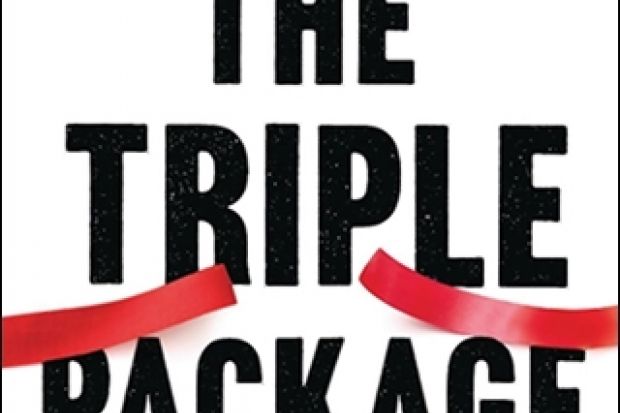Opening the kimono on Asian parenting styles, Amy Chua’s 2011 best-seller Battle Hymn of the Tiger Mother sparked a national and international debate. The child of Chinese immigrants, Chua argued against indulgent Western nurturing that builds children’s self-esteem in favour of strict Chinese discipline that focuses unrelentingly on accomplishment. For Chua’s children, it was all work, all the time: no sleepovers, no play dates, no grades lower than an A. When her high-achieving daughters failed to comply with her rules, Chua called them “garbage” and threatened to burn their stuffed animals. So cruel, yet (if playing Carnegie Hall at the age of 14 and being admitted to Harvard University are any indication) so effective.
On the heels of her parenting-porn memoir, Chua’s new book, The Triple Package, written with husband Jed Rubenfeld, is similarly provocative. Here the Tiger Couple, both professors at Yale Law School, maintain that success is incompatible with America’s feel-good, live-in-the-moment narrative of equality.
If, in general, Americans believe that they are all equal, successful groups believe that they are exceptional. Their accomplishment is the result of this sense of group superiority, along with personal insecurity and impulse control. These three traits comprise the Triple Package.
High-achieving ethnicities tell their members: “You are capable of great things because of the group to which you belong; but you, individually, are not good enough; so you need to control yourself, resist temptation, and prove yourself.” This ethos leads some cultural groups (such as Jews, Mormons, Nigerian immigrants and Chinese-Americans) to be more successful than others.
Groups such as African-Americans lack the Triple Package and therefore fail to prosper. Claiming that this is a result of historical oppression, not genetics, Chua and Rubenfeld insist that their argument is not racist. But let’s just put it this way: I don’t think they’ll be invited to the White House any time soon.
The authors maintain that drive, inspired by feelings of inadequacy, leads to achievement and satisfaction: “Feeling like you’re not good enough is painful. But a life that doesn’t include hard-won accomplishment and triumph over obstacles may not be a satisfying one. There is something deeply fulfilling, even thrilling, in doing almost anything difficult extremely well.”
Success is measured not by personal fulfilment and overall happiness, but by conventional metrics such as income, education and professional attainment. Once success has been achieved, the constraints of the Triple Package can be jettisoned. The ultimate goal of using the Triple Package to climb the ladder of success is ultimately to kick away the ladder. Easy for them to say!
Since Chua and Rubenfeld both belong to Triple-Package groups (she’s Chinese, he’s Jewish), this argument suits them admirably. But their embrace of the Triple Package is not just a kiss on the lips. They alternately praise and, to a lesser extent, pathologise its traits.
As may be obvious by now, there is something in this book to annoy just about everyone. The authors provide a Malcolm Gladwell-esque synthesis of sociological research and anecdotes. They generalise. They categorise. They repeat. The phrase “Triple Package” itself is used by my count (yes, I was counting) no fewer than 100 times – that is, almost every other page. And then there are the “at the end of the day”, “pushing yourself to another level” clichés.
In its own way, Triple Package is as outrageous as Tiger Mother, but it is surprisingly boring. One might at least expect a good read, considering the achievements of both authors (his suspense novels, which made readers shudder; her polemic, which made them gasp). But when they hold hands, the result is sophomoric.
The authors end by extending their theory to the US, which was once a Triple-Package country but has lost its edge. However, it is possible for America to “recover”, since the Triple Package “isn’t members-only” but is open to all.
Not part of a Triple-Package culture? Take heart. With this book as your bible, you, too, can cultivate the three characteristics that ensure success. The Tiger Mother need not be Chinese, just as, I suppose, the Jewish Mother need not be Jewish. But, at least in my personal experience, it helps.
The Triple Package: What Really Determines Success
By Amy Chua and Jed Rubenfeld
Bloomsbury, 336pp, £18.99 and £16.99
ISBN 9781408852231 and 2224 (e-book)
Published 5 February 2014
Register to continue
Why register?
- Registration is free and only takes a moment
- Once registered, you can read 3 articles a month
- Sign up for our newsletter
Subscribe
Or subscribe for unlimited access to:
- Unlimited access to news, views, insights & reviews
- Digital editions
- Digital access to THE’s university and college rankings analysis
Already registered or a current subscriber? Login





